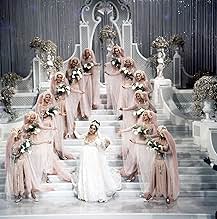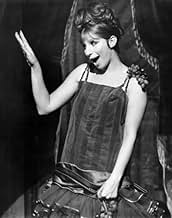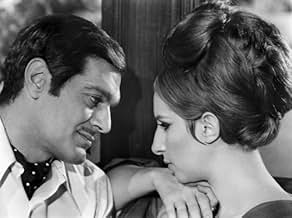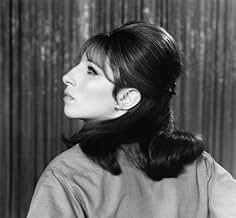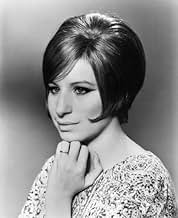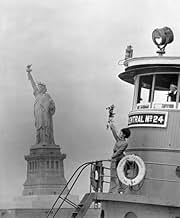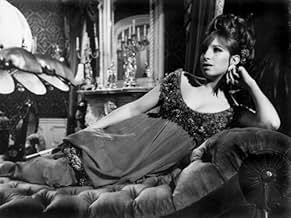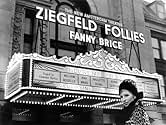AVALIAÇÃO DA IMDb
7,4/10
27 mil
SUA AVALIAÇÃO
Relata a história de Fanny Brice, uma famosa comediante do início do século XX. Vemos sua ascensão à fama, sua carreira subsequente e sua vida pessoal, particularmente seu relacionamento com... Ler tudoRelata a história de Fanny Brice, uma famosa comediante do início do século XX. Vemos sua ascensão à fama, sua carreira subsequente e sua vida pessoal, particularmente seu relacionamento com Nick Arnstein.Relata a história de Fanny Brice, uma famosa comediante do início do século XX. Vemos sua ascensão à fama, sua carreira subsequente e sua vida pessoal, particularmente seu relacionamento com Nick Arnstein.
- Ganhou 1 Oscar
- 8 vitórias e 16 indicações no total
Karen Stride
- Ziegfeld Girl
- (as Karen Lee)
Avaliações em destaque
I've seen this film many times,and I've always thought it was one of Barbra Streisand's best films because it allowed her to use her strengths as a comedian, singer, and dramatic actor. It's clear that her presence dominates the movie; however, there are some excellent supporting players, including Kay Medford as Fanny Brice's mother Rose and Walter Pigeon as Florenz Ziegfeld, two very fine character actors. Rose is particularly likable because, unlike her daughter Fanny, she sees things as they are and not the way they should be. This applies to her comment about Nick Arnstein, the handsome gambler that Fanny marries, despite the fact that Rose perceives him to be a "sponge."
Fanny, as shown in this film, is also very likable not only because of her humor but for her generosity and thoughtfulness. Her ambition, of course, is to conquer the stage and she does so fairly quickly after making a great mess of a roller skate number at the local dance hall. Before long, Fanny is auditioning for Ziegfeld, the famous impressario and she wins him over with her talent and charm. Nick Arnstein, a man about town, always seems to be around Fanny when she triumphs on the stage and this time is no different. He buys her a beautiful bouquet of roses with a note, "Dear Star, I told you so." Very soon, Fanny and Nick become involved in a relationship which is often on and off until Fanny literally proposes to him. What follows is a heartbreaking story of a young woman whose desire to be loved for herself alone and her passion for a happy domestic life is thwarted by fate and some wrong choices.
After a montage of the first year of their marriage together, problems start affecting the Arnstein marriage. It is true that they are wealthy people; however, their problems aren't minor. Nick begins to lose heavily at the gaming table and everything he tries ends in failure. Fanny, on the other hand, continues to be successful on the stage and Nick starts to resent her. Suddenly, all of his gentlemanly charm and good manners disappear as if by magic; he's rude to Fanny, making her upset over things that a truly married couple would find a way to resolve. Indeed, he starts ignoring her deliberately and places his interests and needs above hers. After a while, the marriage collapses not because of Fanny's career but the way in which Nick looks at their relationship (we discover this near the end of the film.) He also conceals his financial problems from her, shutting Fanny out of his life as though she didn't exist.
All of this culminates in Nick's unfortunate involvement in a shady bond scheme which sends him to prison for two years. I would say that these problems are rather huge. I don't want to give more away because I feel others should have the opportunity to see the film and judge for themselves. But I have to say that the ending of the movie, is, in my opinion, one of the most heartfelt, dignified, and classiest moments ever put on film. And Barbra Streisand makes the most of it, touching us not only with her excellent performance of the song "My Man" but also by the way her Fanny carries herself, taking responsibility for her choice and showing that she will go on with her life, despite what's happened to her.
Fanny, as shown in this film, is also very likable not only because of her humor but for her generosity and thoughtfulness. Her ambition, of course, is to conquer the stage and she does so fairly quickly after making a great mess of a roller skate number at the local dance hall. Before long, Fanny is auditioning for Ziegfeld, the famous impressario and she wins him over with her talent and charm. Nick Arnstein, a man about town, always seems to be around Fanny when she triumphs on the stage and this time is no different. He buys her a beautiful bouquet of roses with a note, "Dear Star, I told you so." Very soon, Fanny and Nick become involved in a relationship which is often on and off until Fanny literally proposes to him. What follows is a heartbreaking story of a young woman whose desire to be loved for herself alone and her passion for a happy domestic life is thwarted by fate and some wrong choices.
After a montage of the first year of their marriage together, problems start affecting the Arnstein marriage. It is true that they are wealthy people; however, their problems aren't minor. Nick begins to lose heavily at the gaming table and everything he tries ends in failure. Fanny, on the other hand, continues to be successful on the stage and Nick starts to resent her. Suddenly, all of his gentlemanly charm and good manners disappear as if by magic; he's rude to Fanny, making her upset over things that a truly married couple would find a way to resolve. Indeed, he starts ignoring her deliberately and places his interests and needs above hers. After a while, the marriage collapses not because of Fanny's career but the way in which Nick looks at their relationship (we discover this near the end of the film.) He also conceals his financial problems from her, shutting Fanny out of his life as though she didn't exist.
All of this culminates in Nick's unfortunate involvement in a shady bond scheme which sends him to prison for two years. I would say that these problems are rather huge. I don't want to give more away because I feel others should have the opportunity to see the film and judge for themselves. But I have to say that the ending of the movie, is, in my opinion, one of the most heartfelt, dignified, and classiest moments ever put on film. And Barbra Streisand makes the most of it, touching us not only with her excellent performance of the song "My Man" but also by the way her Fanny carries herself, taking responsibility for her choice and showing that she will go on with her life, despite what's happened to her.
Tour-de-force for Barbra Streisand, reprising her Broadway triumph and taking over the screen as 1930s Ziegfeld singer/comedienne Fanny Brice. Streisand's incredible self-assurance and clowning poise was enough to win her the Best Actress Oscar AND tick off most of Hollywood (few in the business were prepared for someone like Streisand in 1968, except maybe those familiar with her TV work, but the results here show she didn't care what anyone thought of her). The sets look phony, the script is contrived, and Omar Sharif is somewhat miscast as husband Nick Arnstein (Sharif is wonderful in the early stages, but his wet, red eyes and mincing baby-talk grow incredibly weary); however most of the song numbers are fabulous, and Barbra is at her best when delivering a high-powered number. She's tough and unyielding even while doing a comedic bit, but during an emotional song she lets her guard drop a little (not enough to become truly vulnerable, just enough to let us share her pain). The film doesn't exhaust one the way some musical extravaganzas can; the camera-work is uneven and some sequences are overlit, but it has lots of spirit and dazzle. Most importantly, it's a film that remembers it is about a woman and a man, and never allows the show-biz glitter to suffocate the characters. *** from ****
There are not enough superlatives in the world to bestow on Barbra Streisand for her rags-to-riches portrayal of 20s Ziegfeld Follies star Fanny Brice. To say she gives the single most triumphant musical performance ever showcased on the silver screen could be close. I am constantly bowled over with each viewing at how the 26-year-old Brooklyn novice ever pulled off this incredible stunt. Cinderella playing Cinderella. Even the finicky Hollywood powers-that-be, who NEVER use untried screen talent for such a weighty role (Julie Andrews and "My Fair Lady" come to mind), knew that nobody but Barbra could inhabit this part. She won the Oscar, naturally, and it was befitting that the newcomer should share this honor with perhaps the greatest screen legend ever, Katharine Hepburn.
Barbra's Fanny Brice first conquered Broadway where she lost the Tony award to another irrepressible talent, Carol Channing, for "Hello Dolly!" She got her revenge of sorts years later when she won the coveted screen role of Dolly due strictly to her auspicious debut in "Funny Girl." Transferred to celluloid, the movie loosens its bustles quite a bit and grants more breathing room for Barbra to expand her natural comic and dramatic talents both keenly and intimately amid the elaborate sets and costumes.
The timing of this film couldn't have been better for Streisand. The late 60s ushered in a new legion of stars. The rash of talent coming to the forefront purposely lacked the super-model good looks and incredibly-sculpted physiques of their predecessors. Audiences now clamored for realism...human imperfection. What less attractive guys like Dustin Hoffman and Al Pacino did for the men, Barbra did for the distaff side. She dragged out her own Cinderella version, making a virtue of her odd looks and gawky gait while laying out her two big trump cards -- she was a supreme song stylist and a gifted, self-deprecating cut-up.
Hardly ever off screen, Streisand totally immerses herself in the role of chorus clown-turned-Ziegfeld headliner, weaving a spell around each and every song she touches. From the stubbornly optimistic "I'm the Greatest Star" to the profoundly touching "My Man", the actress matures Brice into the glowing swan of her own dreams, while exposing a deep, personal vulnerability she never recaptured (or allowed) again on screen -- to her detriment.
Despite heavy critical lambasting, I still say exotically handsome Omar Sharif was indeed the consummate choice to play wanderlust husband and card shark Nicky Arnstein. Polished, prideful and totally in his element as the global-gambling playboy, one can believe the ungainly Fanny (or Streisand, for that matter) placing this glossy god on a pedestal. It may not appear to be much of a stretch (in real life, Sharif was a world-class bridge player), but he owns the part as much as delightful Kay Medford does as Brice's droll Jewish mama. Everyone else, however, is pretty expendable. It's been said that Anne Francis blamed Streisand for her supposedly top featured role being butchered. If it's true, she has an open-and-shut case. Francis was left with a nothing part.
Highly fictionalized and weak as biography, Streisand champions above the sometimes grandiose material from the moment she utters her first classic words: "Hello, gorgeous!" And so she is.
Barbra's Fanny Brice first conquered Broadway where she lost the Tony award to another irrepressible talent, Carol Channing, for "Hello Dolly!" She got her revenge of sorts years later when she won the coveted screen role of Dolly due strictly to her auspicious debut in "Funny Girl." Transferred to celluloid, the movie loosens its bustles quite a bit and grants more breathing room for Barbra to expand her natural comic and dramatic talents both keenly and intimately amid the elaborate sets and costumes.
The timing of this film couldn't have been better for Streisand. The late 60s ushered in a new legion of stars. The rash of talent coming to the forefront purposely lacked the super-model good looks and incredibly-sculpted physiques of their predecessors. Audiences now clamored for realism...human imperfection. What less attractive guys like Dustin Hoffman and Al Pacino did for the men, Barbra did for the distaff side. She dragged out her own Cinderella version, making a virtue of her odd looks and gawky gait while laying out her two big trump cards -- she was a supreme song stylist and a gifted, self-deprecating cut-up.
Hardly ever off screen, Streisand totally immerses herself in the role of chorus clown-turned-Ziegfeld headliner, weaving a spell around each and every song she touches. From the stubbornly optimistic "I'm the Greatest Star" to the profoundly touching "My Man", the actress matures Brice into the glowing swan of her own dreams, while exposing a deep, personal vulnerability she never recaptured (or allowed) again on screen -- to her detriment.
Despite heavy critical lambasting, I still say exotically handsome Omar Sharif was indeed the consummate choice to play wanderlust husband and card shark Nicky Arnstein. Polished, prideful and totally in his element as the global-gambling playboy, one can believe the ungainly Fanny (or Streisand, for that matter) placing this glossy god on a pedestal. It may not appear to be much of a stretch (in real life, Sharif was a world-class bridge player), but he owns the part as much as delightful Kay Medford does as Brice's droll Jewish mama. Everyone else, however, is pretty expendable. It's been said that Anne Francis blamed Streisand for her supposedly top featured role being butchered. If it's true, she has an open-and-shut case. Francis was left with a nothing part.
Highly fictionalized and weak as biography, Streisand champions above the sometimes grandiose material from the moment she utters her first classic words: "Hello, gorgeous!" And so she is.
There are two important things to remember about Funny Girl when writing about it or discussing it. The first is Nicky Arnstein was still alive in 1964 when it debuted on Broadway, he died the following year. The second is that Ray Stark, the producer of Funny Girl on stage and on the screen is the son-in-law of Fanny Brice and Nicky Arnstein. So off the bat you know you're going to get a sanitized version.
Not that what they created was bad, how could it be for giving Barbra Streisand the role that made her a star on both stage and screen. Fanny Brice didn't do too bad out of it either, unlike a lot of her contemporaries she lives on through the artistry and interpretation of an icon in a future age.
But was Fanny's story ever given the literary dry process cleaning. Eliminated was her brief marriage to a first husband. Changed is the fact that she knew exactly who at what Arnstein was before she married him. Arnstein was a big time con artist who had no shame whatsoever in using his famous wife's name as a come on. Fanny herself though was never involved in any of his schemes. Arnstein did in fact take the fall and never squealed on any of the ones behind him who certainly were more than capable of reprisals against him and possibly against Fanny Brice.
Jule Styne and Bob Merrill wrote the original songs for the Broadway score and added one song, Funny Girl, for the film. But still the two standouts are Barbra Streisand's classic People and Don't Rain On My Parade, a couple of standards she's made almost exclusively her own. I don't think anyone else would attempt to sing them.
Added to the film are a couple of contemporary songs that Fanny Brice made famous that Barbra reinterpreted, the classic My Man, a song she sang before Nicky Arnstein went to the joint, but still is identified as her lament for her husband in stir. She also sang Second Hand Rose, a really great comedy song, emphasizing Brice's Jewish heritage. I wish a couple of others had gotten in there. I've got Brice recordings of Cooking Breakfast For The One I Love and I'm An Indian. That last one is especially hysterical, Brice did it one of the Ziegfeld Follies dressed as an indigenous person to this continent with the last line being "I'm a Yiddishe Squaw". It's great to hear and must have been fabulous to see.
Funny Girl got seven nominations which included Best Picture, Best Sound, Best Song, Best Musical Scoring, Best Editing, Best Cinematography and a Best Supporting Actress nomination for Kay Medford, the only other player from Broadway besides Streisand to be in the film. But the only Oscar it got was a shared one when Barbra Streisand tied for Best Actress with Katharine Hepburn. One of the very few times someone got an Oscar for their very first big screen effort.
Of course two things helped Barbra greatly. One was a role she had made her own and the second was direction by William Wyler who has won Best Director three times in his career and directed more players to Academy Awards than any other. Barbra was his last. Oddly enough he wasn't nominated for Best Director.
Those who are interested in seeing Fanny Brice as she really was can see her in The Great Ziegfeld, The Ziegfeld Follies, and Everybody Sing all of which are out on DVD and/or VHS. I think Barbra channeled more of Fanny into Funny Girl than the sequel Funny Lady, but I'll let you the viewer be the judge of that.
You can't go wrong seeing and hearing Barbra Streisand do some of the best material ever written for her in both films.
Not that what they created was bad, how could it be for giving Barbra Streisand the role that made her a star on both stage and screen. Fanny Brice didn't do too bad out of it either, unlike a lot of her contemporaries she lives on through the artistry and interpretation of an icon in a future age.
But was Fanny's story ever given the literary dry process cleaning. Eliminated was her brief marriage to a first husband. Changed is the fact that she knew exactly who at what Arnstein was before she married him. Arnstein was a big time con artist who had no shame whatsoever in using his famous wife's name as a come on. Fanny herself though was never involved in any of his schemes. Arnstein did in fact take the fall and never squealed on any of the ones behind him who certainly were more than capable of reprisals against him and possibly against Fanny Brice.
Jule Styne and Bob Merrill wrote the original songs for the Broadway score and added one song, Funny Girl, for the film. But still the two standouts are Barbra Streisand's classic People and Don't Rain On My Parade, a couple of standards she's made almost exclusively her own. I don't think anyone else would attempt to sing them.
Added to the film are a couple of contemporary songs that Fanny Brice made famous that Barbra reinterpreted, the classic My Man, a song she sang before Nicky Arnstein went to the joint, but still is identified as her lament for her husband in stir. She also sang Second Hand Rose, a really great comedy song, emphasizing Brice's Jewish heritage. I wish a couple of others had gotten in there. I've got Brice recordings of Cooking Breakfast For The One I Love and I'm An Indian. That last one is especially hysterical, Brice did it one of the Ziegfeld Follies dressed as an indigenous person to this continent with the last line being "I'm a Yiddishe Squaw". It's great to hear and must have been fabulous to see.
Funny Girl got seven nominations which included Best Picture, Best Sound, Best Song, Best Musical Scoring, Best Editing, Best Cinematography and a Best Supporting Actress nomination for Kay Medford, the only other player from Broadway besides Streisand to be in the film. But the only Oscar it got was a shared one when Barbra Streisand tied for Best Actress with Katharine Hepburn. One of the very few times someone got an Oscar for their very first big screen effort.
Of course two things helped Barbra greatly. One was a role she had made her own and the second was direction by William Wyler who has won Best Director three times in his career and directed more players to Academy Awards than any other. Barbra was his last. Oddly enough he wasn't nominated for Best Director.
Those who are interested in seeing Fanny Brice as she really was can see her in The Great Ziegfeld, The Ziegfeld Follies, and Everybody Sing all of which are out on DVD and/or VHS. I think Barbra channeled more of Fanny into Funny Girl than the sequel Funny Lady, but I'll let you the viewer be the judge of that.
You can't go wrong seeing and hearing Barbra Streisand do some of the best material ever written for her in both films.
...Perhaps not. But for nearly 2 1/2 hours in "Funny Girl," Barbra Streisand at least makes a convincing case for herself.
Forget about the television airings you've seen. Throw away your old video cassette copy. Instead, see the restored, widescreen, road show version now in limited theatrical release. It is the ONLY way to truly appreciate the talents of Ms. Streisand and, more notably, the film's brilliant director, William Wyler.
Movies today no longer look like movies. The highest compliment one can pay "Funny Girl" is that it is a grand, glorious MOVIE in the truest sense. Wyler's brilliance is never more evident than in his glorious treatment of the "Don't Rain on My Parade" sequence, the stunning camerawork of "The Swan," and the incredibly effective set-up of the "My Man" finale.
Ms. Streisand doesn't really give a performance; she simply is Barbra. Every "Barbra-ism" that we have come to know, love and hate over the years is already crystallized at this point. Her brashness can be off-putting, but by the end of the movie, one is completely won over by the sheer enormity of her talent and presence. Yes, you can see the beginnings of the blind egomania that has marred her performances for the last 20-odd years (to be generous); but you cannot deny her brilliance, either. And to see her extraordinary face in full-screen close up is breathtaking. Kudos to the director, lighting director, and make-up artist for making Streisand appear so wonderful in this.
From the sweepingly orchestrated titles to the high-drama impact of the showstopping finale, this is Entertainment with a capital E. About 20 minutes could have been trimmed, and exactly why Omar Sharif was cast remains a mystery; but at the end of the picture, these quibbles are trivial. Did I laugh? Yes. Did I cry? Yes. Was I thrilled, excited, entertained? You betcha.
Forget about the television airings you've seen. Throw away your old video cassette copy. Instead, see the restored, widescreen, road show version now in limited theatrical release. It is the ONLY way to truly appreciate the talents of Ms. Streisand and, more notably, the film's brilliant director, William Wyler.
Movies today no longer look like movies. The highest compliment one can pay "Funny Girl" is that it is a grand, glorious MOVIE in the truest sense. Wyler's brilliance is never more evident than in his glorious treatment of the "Don't Rain on My Parade" sequence, the stunning camerawork of "The Swan," and the incredibly effective set-up of the "My Man" finale.
Ms. Streisand doesn't really give a performance; she simply is Barbra. Every "Barbra-ism" that we have come to know, love and hate over the years is already crystallized at this point. Her brashness can be off-putting, but by the end of the movie, one is completely won over by the sheer enormity of her talent and presence. Yes, you can see the beginnings of the blind egomania that has marred her performances for the last 20-odd years (to be generous); but you cannot deny her brilliance, either. And to see her extraordinary face in full-screen close up is breathtaking. Kudos to the director, lighting director, and make-up artist for making Streisand appear so wonderful in this.
From the sweepingly orchestrated titles to the high-drama impact of the showstopping finale, this is Entertainment with a capital E. About 20 minutes could have been trimmed, and exactly why Omar Sharif was cast remains a mystery; but at the end of the picture, these quibbles are trivial. Did I laugh? Yes. Did I cry? Yes. Was I thrilled, excited, entertained? You betcha.
Você sabia?
- CuriosidadesWilliam Wyler was asked by a friend whether Barbra Streisand had been hard to work with. He replied, "No, not too hard, considering it was the first movie she ever directed."
- Erros de gravaçãoAfter Nick's release from prison in 1927, he and Fanny did not sadly but amicably part. Instead, Nick rewarded Fanny's years of support by almost immediately starting a series of affairs. Fanny demanded he give her grounds for divorce and even had their children's last name legally changed to Brice. Although he and Fanny would meet again several years later, he never attempted to see his children again.
- Citações
Fannie Brice: I'm a bagel on a plate full of onion rolls!
- Versões alternativasThe original theatrical version included an additional overture before the opening credits, an intermission after "Don't Rain On My Parade," and exit music after the end credits. These additional music pieces have been restored for the DVD release.
- ConexõesFeatured in This Is Streisand (1968)
Principais escolhas
Faça login para avaliar e ver a lista de recomendações personalizadas
- How long is Funny Girl?Fornecido pela Alexa
Detalhes
- Data de lançamento
- País de origem
- Idioma
- Também conhecido como
- Funny Girl: Chica rara
- Locações de filme
- Jersey Central Railway Station, Jersey City, Nova Jersey, EUA('Don't Rain On My Parade' sequence)
- Empresas de produção
- Consulte mais créditos da empresa na IMDbPro
Bilheteria
- Orçamento
- US$ 14.100.000 (estimativa)
- Faturamento bruto nos EUA e Canadá
- US$ 52.223.306
- Fim de semana de estreia nos EUA e Canadá
- US$ 65.560
- 3 de set. de 2001
- Faturamento bruto mundial
- US$ 52.225.786
- Tempo de duração
- 2 h 31 min(151 min)
- Cor
- Proporção
- 2.35 : 1
Contribua para esta página
Sugerir uma alteração ou adicionar conteúdo ausente




